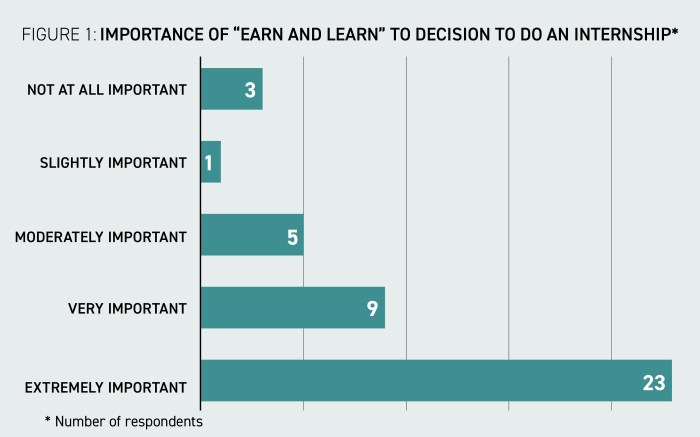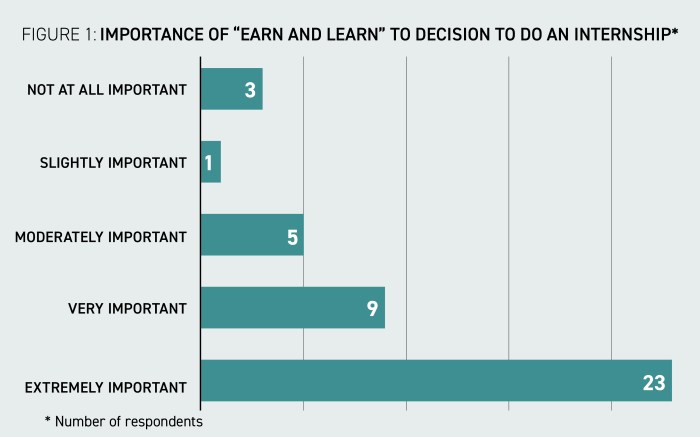
Almost half of young people have undertaken unpaid internships, a trend that raises critical questions about career development, equity, and the future of work. This isn’t just a fleeting phenomenon; it’s a significant shift in how young people navigate their entry into the professional world. This exploration delves into the motivations behind this choice, the potential impacts on both individuals and the broader economy, and the implications for the future.
From historical trends to regional variations, we’ll examine the prevalence of unpaid internships across demographics, dissecting the motivations and impacts on educational outcomes and skill development. We’ll also compare unpaid internships to paid alternatives, exploring the economic factors influencing the decision and potential equity implications. Finally, we’ll look towards the future, examining potential trends, policy implications, and recommendations for improving these programs.
Unpaid Internship Prevalence
Unpaid internships have become a pervasive aspect of the job market, particularly for young people seeking entry-level experience. While offering potential benefits like practical skills and networking opportunities, the practice is also fraught with ethical and legal complexities. This exploration delves into the history, demographics, and legal landscape surrounding unpaid internships, highlighting the need for a balanced approach that protects both the intern and the employer.The prevalence of unpaid internships has grown significantly in recent decades, with various factors contributing to this trend.
Initially, unpaid internships were less common and often viewed as a stepping stone to paid positions. However, as the job market has become increasingly competitive, the appeal of gaining experience without financial compensation has risen. This has led to a complex situation where the practice can be beneficial but also problematic.
Historical Overview of Unpaid Internships
The concept of unpaid internships has roots in traditional apprenticeship models. However, the modern form of unpaid internships, as a significant component of the job market, has evolved over time. Early examples focused on vocational training and practical skill development, often within specific industries. The growing prevalence of unpaid internships in recent decades is intertwined with the rising competitiveness of the job market and the perceived value of practical experience.
This evolution has led to a more complex situation, demanding a critical examination of both the benefits and drawbacks.
Demographic Variations in Unpaid Internship Prevalence
Unpaid internships are not evenly distributed across all demographics. Age plays a significant role, with younger individuals more likely to participate due to the perceived value of experience. Educational attainment also impacts participation, with students from higher education backgrounds potentially having greater access to opportunities. Socioeconomic factors also contribute to differences in prevalence. Individuals from more privileged backgrounds may have greater access to networks and opportunities, leading to a potential disparity in access.
This uneven distribution highlights the need for policies and initiatives that address potential inequalities.
Legal and Ethical Considerations Surrounding Unpaid Internships
The legal and ethical considerations surrounding unpaid internships are multifaceted and often depend on the specific jurisdiction. Federal and state laws in many countries have established criteria for determining whether an internship is truly educational and beneficial for the intern. These criteria typically include the presence of structured training, supervision, and the intern’s level of participation in the employer’s core activities.
Failure to meet these criteria can lead to the intern being classified as an employee, triggering the obligation to pay wages. Ethical considerations extend beyond legal requirements, emphasizing fairness and the protection of interns’ rights.
Global Distribution of Unpaid Internship Programs
| Region | Prevalence of Unpaid Internship Programs | Variations |
|---|---|---|
| North America | High | Variations in legal frameworks and enforcement across different states/countries. |
| Europe | Moderate to High | Varying legal interpretations and regulations regarding internship agreements. |
| Asia | Growing | Cultural factors and evolving labor laws influence the prevalence. |
| South America | Moderate | Legal frameworks are still developing in some regions. |
| Africa | Varying | Significant variations across countries, influenced by economic conditions and labor laws. |
This table provides a general overview of the global distribution of unpaid internship programs. The specific prevalence and nature of these programs can vary significantly within each region due to diverse economic situations, cultural norms, and legal frameworks. This demonstrates the complexity and need for careful consideration of the local context when assessing unpaid internships.
Motivations and Impacts
Unpaid internships, while prevalent among young people, raise complex questions about their value and long-term consequences. Understanding the motivations behind these experiences, both for the intern and the host organization, is crucial to assessing their overall impact. This exploration will delve into the potential benefits and drawbacks of unpaid internships for career development, analyze their potential negative effects on the job market, and examine the potential long-term impact on young people’s professional trajectories.This analysis examines the multifaceted nature of unpaid internships, acknowledging the motivations of both the intern and the organization while considering the broader implications for the individual and the economy.
It is vital to recognize the complexities involved, rather than simply focusing on one perspective.
Motivations Behind Unpaid Internships
Understanding the motivations behind unpaid internships requires considering the perspectives of both the intern and the host organization. Interns might seek valuable experience, networking opportunities, or a chance to gain practical skills in their chosen field. Organizations might value the unpaid labor as a cost-effective way to gain insights into potential future employees or to augment their existing team with fresh perspectives.
The potential for a win-win scenario exists, but only under specific conditions.
Benefits and Drawbacks for Career Development
Unpaid internships can offer significant benefits to young people’s career development. Practical experience, valuable networking opportunities, and a deeper understanding of a particular industry are often cited advantages. However, drawbacks include the potential for limited professional growth due to the lack of compensation and the risk of hindering career progression if the internship does not provide tangible outcomes.
In some cases, the intern might be required to perform tasks that are not directly related to their career goals, potentially diminishing the experience’s value.
Negative Impacts on the Job Market and Economy
Unpaid internships can potentially contribute to a competitive job market where many young people are vying for limited paid opportunities. The practice might discourage wage growth and lead to a situation where many young people are employed in undervalued positions, ultimately hindering economic growth. This is particularly true when unpaid internships displace paid opportunities for recent graduates or experienced workers.
Long-Term Impacts on Career Trajectories
The long-term impacts of unpaid internships on career trajectories are complex and varied. While some interns might benefit from valuable experience and networking opportunities, others might face difficulties in securing subsequent employment or experience a negative impact on their earning potential in the long run. The specific impact will depend on the type of internship, the intern’s skills and motivations, and the overall job market conditions.
It’s pretty eye-opening that almost half of young people have taken on unpaid internships. This, coupled with the recent surge in popularity of line-cutting apps, like those inspired by Chinese New Year festivities here , suggests a fascinating dynamic at play. Perhaps the pressure to stand out and gain experience is leading to these unconventional solutions, highlighting the lengths some are going to in the job market.
The trend of unpaid internships remains a significant concern, regardless of the innovative apps.
Perceived Value of Unpaid Internships
| Aspect | Positive Assessment | Negative Assessment |
|---|---|---|
| Experience gained | Practical skills development, industry insights, networking | Limited professional growth, lack of tangible outcomes |
| Career progression | Potential for future employment opportunities | Potential for hindering career progression, difficulties in securing subsequent employment |
| Financial implications | Reduced financial burden on individuals | Loss of potential income, wage stagnation |
| Job market impact | Potential for gaining valuable experience, reduced competition | Potential for discouraging wage growth, displacement of paid opportunities |
Impact on Education and Skills Development
Unpaid internships, while offering valuable experience, present a complex relationship with educational outcomes. Their impact on learning and skill development varies greatly depending on the nature of the internship, the student’s prior knowledge, and the support structure provided. Understanding this interplay is crucial for assessing the true value of these experiences.The potential for unpaid internships to enhance educational outcomes is significant, particularly when they align with a student’s academic interests and career goals.
These opportunities can provide a bridge between theoretical knowledge and practical application, enriching the learning experience and offering a glimpse into the realities of professional life. However, the lack of compensation can introduce potential challenges, such as time constraints and financial pressures, which may negatively affect academic performance.
Potential Impact on Educational Outcomes
Unpaid internships can significantly influence students’ academic performance, both positively and negatively. Positive outcomes often arise when the internship directly relates to the student’s field of study. Students who apply classroom knowledge in a practical setting can gain a deeper understanding of the subject matter, potentially boosting their academic engagement and performance. Conversely, a poorly matched or overly demanding internship can lead to stress, reduced time for studying, and ultimately, a decline in academic performance.
Contribution to Practical Skills and Knowledge
Unpaid internships offer a unique opportunity for developing practical skills that often go beyond the scope of formal training programs. These experiences allow students to apply theoretical concepts in real-world scenarios, build practical problem-solving abilities, and gain insights into the professional environment. This includes tasks like teamwork, communication, and time management, all crucial for success in the workplace.
For instance, an internship in a marketing agency might allow a student to implement marketing strategies, analyze data, and work collaboratively with a team, developing skills directly applicable to future roles.
It’s a little crazy that almost half of young people have undertaken unpaid internships, isn’t it? Thinking about the dedication and sacrifice involved, it makes you wonder if these experiences are truly worthwhile. Meanwhile, there’s this whole other story brewing with the recent mishap of a Japanese city accidentally tweeting about a North Korean attack, highlighting how easily things can go awry in the digital age.
This whole incident certainly adds another layer to the discussion around unpaid internships, and how vital clear communication and procedures are in any organization, especially in the digital sphere. Ultimately, it just underscores how much more training and awareness are needed in the digital workforce, especially in the face of such significant societal changes.
Influence on Students’ Academic Performance
The influence of unpaid internships on academic performance is not uniform. Students with strong time management skills and a clear understanding of their academic priorities can often successfully juggle internship responsibilities and coursework. However, students who lack these skills or face significant time constraints may find their academic performance compromised. This highlights the importance of careful planning and effective time management strategies for students engaging in unpaid internships.
Comparison of Skill Sets
Formal training programs typically focus on structured learning and the acquisition of theoretical knowledge. While they offer a strong foundation, they often lack the hands-on experience and practical skills development provided by unpaid internships. Unpaid internships, in contrast, provide a platform for practical application and the development of essential soft skills. However, they may not cover the breadth of theoretical knowledge that formal programs provide.
Therefore, the combination of both formal education and practical experience, such as an unpaid internship, can yield a well-rounded skill set.
Skills Developed and Perceived Relevance
| Skill | Relevance to Future Employment |
|---|---|
| Problem-solving | High; essential for tackling challenges in the workplace. |
| Communication (written & verbal) | High; crucial for effective collaboration and professional interactions. |
| Time management | High; vital for meeting deadlines and managing multiple tasks. |
| Teamwork | High; working effectively in groups is common in many jobs. |
| Adaptability | High; adjusting to new situations and changing priorities is important. |
| Research | High; finding and evaluating information is essential in many roles. |
| Technical skills (specific to field) | Variable; depends on the internship and future career path. |
Comparison to Paid Alternatives

Unpaid internships, while offering valuable experience, often raise concerns about their value relative to paid alternatives. This section delves into the trade-offs between unpaid and paid internship opportunities, analyzing the potential equity implications and economic factors influencing these choices. It also explores the challenges faced by young people seeking paid employment after an unpaid internship.The allure of an unpaid internship often lies in the prospect of gaining practical skills and industry connections.
However, this comes at a cost. Understanding the potential benefits and drawbacks of unpaid internships in comparison to paid options is crucial for young people making career decisions. This comparison considers the financial and non-financial implications of each choice.
Benefits of Unpaid Internships
Unpaid internships can provide valuable networking opportunities and the chance to gain experience in a specific field. These experiences are often cited as crucial stepping stones in a career. The exposure to real-world work environments, though unpaid, allows for development of practical skills that might not be acquired in traditional classroom settings.
Potential Equity Implications
The prevalence of unpaid internships raises concerns about equity. Young people from disadvantaged backgrounds may be disproportionately affected by the financial constraints associated with unpaid internships. Access to paid opportunities might be limited for those who choose unpaid internships, potentially widening the existing gap between privileged and less privileged individuals.
Economic Factors Influencing the Decision
Financial constraints are a major factor influencing the decision to accept an unpaid internship over a paid alternative. Students and young professionals often weigh the value of experience against the need for immediate financial support. The perceived long-term benefits of the experience may outweigh the short-term financial sacrifice. For example, a recent graduate might accept an unpaid internship in a specific field to gain experience that can lead to higher-paying jobs later.
Barriers to Accessing Paid Employment
Young people who undertake unpaid internships may face barriers to accessing paid employment opportunities. Potential employers might perceive unpaid internships as a lack of commitment or financial need. This can create a cycle where unpaid internships can hinder the advancement of individuals who might have otherwise gained paid employment opportunities.
Comparison Table: Paid vs. Unpaid Internships
| Feature | Paid Internship | Unpaid Internship |
|---|---|---|
| Financial Benefits | Salary, potential benefits (health insurance, retirement plan) | No salary, no benefits |
| Financial Implications | Reduced financial burden; potentially higher long-term earnings | Potential financial strain, possible reliance on personal funds |
| Non-Financial Benefits | Experience, networking, professional development | Experience, networking, professional development, potential to build a professional network |
| Potential Employer Perception | Stronger indication of commitment and financial stability | Potential perception of lower commitment or financial need |
| Equity Considerations | More equitable access for individuals with financial resources | Potential for exacerbating existing equity gaps |
Future Trends and Implications: Almost Half Of Young People Have Undertaken Unpaid Internships
The prevalence of unpaid internships continues to be a significant concern, impacting young people’s career paths and educational outcomes. Understanding potential future trends and their implications is crucial for policymakers and educators to address the issue effectively. This exploration delves into potential developments, policy considerations, and recommendations for improving the fairness and effectiveness of unpaid internships.The increasing demand for practical experience in the job market, coupled with the economic realities of many young people, is likely to maintain the appeal of unpaid internships.
However, the ethical and educational implications of such arrangements require careful consideration and potential intervention.
Potential Future Trends in Unpaid Internship Prevalence
The demand for practical experience and the economic realities of many young people will likely sustain the appeal of unpaid internships. This demand is fueled by the need to gain skills and experience for a competitive job market. However, this is juxtaposed with the financial limitations faced by many young people and their families, making unpaid internships an accessible option, despite potential drawbacks.
Potential Policy Implications for Regulating or Supporting Unpaid Internships
The need for policy interventions to regulate or support unpaid internships is increasingly apparent. Potential policy implications include creating clear guidelines and standards for these programs, establishing minimum compensation levels, and ensuring that internships contribute meaningfully to the development of skills and knowledge.
It’s a bit shocking that almost half of young people have undertaken unpaid internships, isn’t it? Thinking about the valuable experience they gain, it’s also important to ensure you have the right tools for your learning. If you’re feeling a little sluggish with your laptop performance, consider ramping up your laptops ram here for a smoother workflow.
Ultimately, all this effort to boost performance should pay off, just like these unpaid internships are hopefully paving the way for future career success.
Recommendations for Improving the Fairness and Effectiveness of Unpaid Internship Programs, Almost half of young people have undertaken unpaid internships
Improving the fairness and effectiveness of unpaid internship programs necessitates a multi-pronged approach. Recommendations include ensuring clear agreements between the intern and the host organization, specifying the learning objectives and expected outcomes, and promoting transparency in the internship experience. Furthermore, robust oversight mechanisms are essential to ensure compliance with established standards.
Potential Future Impacts on Education and Training Systems
Unpaid internships’ continued presence may lead to modifications in educational and training systems. This could involve integrating internship opportunities into curriculum design to enhance practical learning and skills development. Alternatively, it could involve creating separate, accredited training programs for unpaid internships to provide a structured approach. The long-term impacts on the overall education system require ongoing monitoring and evaluation.
Potential Government Interventions to Address Issues Raised by Unpaid Internships
Government interventions can play a crucial role in mitigating the negative aspects of unpaid internships. Potential government interventions include:
- Establishing minimum compensation standards: This would ensure interns receive fair compensation for their work, preventing exploitation and promoting a more equitable system.
- Mandating clear learning objectives and outcomes: This would ensure internships provide valuable learning experiences, aligning with educational goals and promoting skills development.
- Creating oversight mechanisms for compliance: This would hold organizations accountable for adhering to established standards and regulations, fostering a trustworthy internship environment.
- Providing funding for internship programs with clear learning objectives: This could offer a path for qualified individuals who might otherwise not be able to afford an unpaid internship.
- Promoting partnerships between educational institutions and employers: This would enhance the quality of internships and provide structured support for both interns and organizations.
Illustrative Examples and Case Studies
Unpaid internships, while often perceived with skepticism, can be powerful tools for skill development and career exploration. Examining successful programs and the experiences of those who have participated offers valuable insights into their potential benefits. Understanding the specific contexts, motivations, and outcomes can help us better evaluate the impact of unpaid internships on individuals and organizations.Successful unpaid internships often foster a strong connection between the intern and the organization.
This connection can lead to meaningful learning experiences, both in terms of practical skills and broader career insights. Furthermore, well-structured programs can equip interns with the essential skills needed to excel in their future endeavors.
Examples of Successful Unpaid Internship Programs
These programs often align with specific career goals and provide practical experience in relevant industries. They demonstrate the potential for unpaid internships to provide valuable opportunities for learning and growth.
- A non-profit organization dedicated to environmental conservation offers a 10-week summer internship program. Interns assist with data collection, research, and outreach activities. This program allows participants to gain valuable hands-on experience in environmental science and conservation. Interns often develop data analysis skills, communication abilities, and an understanding of the non-profit sector. Successful program participants often secure further internships or entry-level positions in related fields, demonstrating the program’s positive impact on career progression.
- A marketing agency offers a 6-month internship focusing on digital marketing strategies. Interns collaborate on client projects, assisting with social media management, content creation, and optimization. Interns gain practical experience with industry-standard software and tools. They also develop crucial soft skills such as teamwork, communication, and problem-solving, which are highly valued by employers.
Skills and Knowledge Gained by Interns
The skills and knowledge interns acquire are highly valuable and contribute significantly to their professional development. They represent the tangible benefits of participation in unpaid internships.
- Interns in a software development program honed their coding skills, learned new programming languages, and developed problem-solving abilities through hands-on projects. Their proficiency in specific software packages and industry standards became evident through the projects they completed.
- Participants in a journalism internship gained experience in writing, editing, and fact-checking. They developed strong communication skills, learned about news gathering, and gained valuable experience in a fast-paced environment. Interns were frequently praised for their ability to meet deadlines and contribute to the team effectively.
Organizations Successfully Integrating Unpaid Interns
Well-structured programs can integrate unpaid interns seamlessly into an organization’s operations, leading to mutual benefit. This mutual benefit fosters a supportive and learning environment for both the organization and the intern.
- A marketing agency successfully integrated interns into their day-to-day operations. Interns assisted with various projects, from social media management to email campaigns. This integration enabled interns to gain real-world experience and contribute to the agency’s success.
- A small startup utilized unpaid interns for administrative tasks and research, significantly reducing workload on existing staff. This collaboration benefited the startup by allowing them to manage their operations more efficiently, while interns gained practical experience in business administration.
Outcomes for Interns
The positive outcomes of unpaid internships can be substantial, impacting career trajectories in numerous ways.
- An intern who participated in a research program developed a strong understanding of their chosen field. They gained valuable research skills and a deeper insight into the specific methodology required for their chosen career path. This intern’s experience contributed significantly to their future success in securing further opportunities in the field.
Case Study: A Journalism Internship
This case study highlights the experiences of an intern involved in a journalism internship, detailing their motivations, challenges, and outcomes.
Amelia, a recent college graduate, was motivated by a desire to gain practical experience in journalism. She sought an unpaid internship at a local newspaper. Challenges included a steep learning curve and the pressure of meeting tight deadlines. Despite these challenges, Amelia successfully contributed to several articles and developed essential communication and research skills. This experience led to a full-time position at a regional news outlet.
This demonstrates the transformative power of a well-structured unpaid internship.
Final Conclusion

The widespread adoption of unpaid internships reveals a complex interplay of economic pressures, career aspirations, and societal expectations. While offering potential benefits for skill development and gaining practical experience, they also present significant challenges related to equity, fairness, and the broader impact on the job market. Ultimately, understanding the motivations, impacts, and future implications of this trend is crucial for fostering a more just and equitable system for young people entering the workforce.






